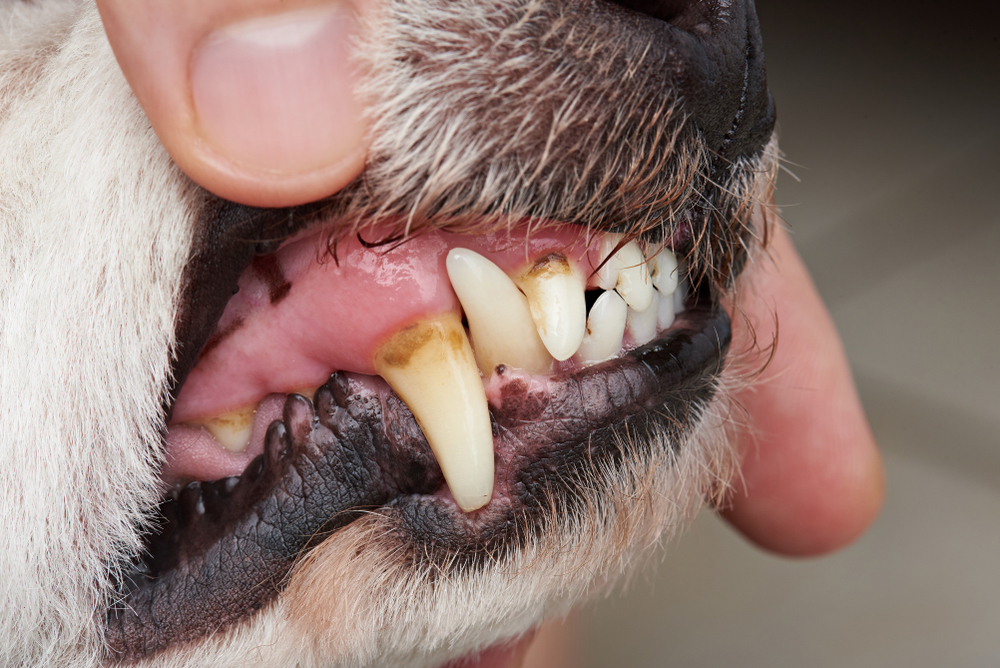If your furry friend’s bad breath is no longer just a harmless joke, it might be time to focus on their dental health. Did you know that by the age of three, most pets have some form of dental disease? Luckily, this guide will arm you with veterinarian-approved tips to tackle plaque and keep those pearly whites shining.
Keep reading for a happier, healthier pet smile!
Understanding Dental Disease in Pets
Dental disease in pets can lead to serious health issues, including tooth loss and infection. Recognizing signs of dental problems is crucial for maintaining your pet’s overall well-being.
What is dental disease?
Dental disease in pets, much like in humans, involves problems with the teeth, gums, and mouth. It often starts with a buildup of plaque — that sticky film on teeth filled with bacteria.
If not removed by brushing or chewing, plaque can harden into tartar pretty quickly. This may lead to gingivitis, which is the reddening and swelling of gums. If left unchecked, it can worsen into periodontal disease where the structures supporting teeth get damaged.
Your pet may show signs of dental disease through bad breath that doesn’t fade, yellow or brown tartar on their teeth, or discomfort while eating. Other symptoms include bleeding gums and lost or loose teeth.
Ignoring these signs puts your pet at risk for more than just oral pain; it can actually pave the way for heart and kidney diseases as bacteria from the mouth enter the bloodstream.
Regular veterinary checkups play an essential role in catching dental problems early before they become severe health issues for your furry friend.
Potential risks and consequences
Pet dental disease can lead to serious health issues for your furry friend. Untreated dental problems can result in pain, difficulty eating, and even tooth loss. If left unchecked, the bacteria from dental disease can enter the bloodstream and affect vital organs like the heart and kidneys.
Additionally, poor oral hygiene in pets may contribute to bad breath and overall discomfort. Regular at-home care and professional veterinary checkups are crucial in preventing these potential risks.
When dental issues arise, they can escalate rapidly causing not only physical pain but also emotional distress for both you and your pet. It’s essential to be proactive in maintaining your pet’s oral health to avoid these potential risks associated with untreated dental disease.
Identifying signs and symptoms of dental problems
Regular dental care can help prevent potential risks and consequences for your furry friend. Identifying signs and symptoms of dental problems is crucial for maintaining your pet’s oral health.
Look out for symptoms such as bad breath, loose or discolored teeth, swollen gums, excessive drooling, reluctance to eat hard food, and pawing at the mouth. Additionally, behavioral changes like irritability or depression may also indicate an underlying dental issue in pets.
Early detection of these signs can lead to timely intervention and treatment, ensuring your pet’s continued well-being.
Importance of Preventive Care
Regular dental exams and proper nutrition play a crucial role in maintaining your pet’s oral health. Learn about the benefits of preventive care and how to brush your pet’s teeth at home for optimal dental health.
Benefits of regular dental exams
Regular dental exams for your pet are essential for maintaining their oral health. These check-ups allow the veterinarian to detect any potential issues early, preventing more severe problems down the line.
With regular dental exams, tartar buildup and gum disease can be identified and treated promptly, leading to improved overall health for your furry friend.
During these examinations, the vet will also assess your pet’s teeth and gums, providing personalized advice on at-home dental care and recommending appropriate products. In addition to addressing existing problems, regular dental check-ups can also help prevent future dental issues from arising, ensuring that your pet maintains strong teeth and healthy gums throughout their life.
The role of diet and nutrition
A balanced diet is vital for your pet’s dental health. Foods high in sugar and carbohydrates can contribute to plaque and tartar buildup, leading to dental issues. Incorporating dental-friendly foods and treats into their diet helps control plaque and promotes oral health.
Consult with your veterinarian about specialized dental diets and suitable treats for your pet’s specific needs.
By focusing on the right nutrition, you can actively contribute to maintaining your pet’s oral hygiene without solely relying on toothbrushing and professional cleanings.
How to brush your pet’s teeth at home
To brush your pet’s teeth at home, start by using a toothbrush and toothpaste specifically designed for pets. Gently lift the lips to expose the teeth, then brush in circular motions, focusing on the gum line.
Be sure to reward your pet with praise or a treat afterward for positive reinforcement. Gradually introduce brushing if your pet is not used to it; patience is key. Aim to brush their teeth every day for best results.
Regular toothbrushing helps prevent plaque buildup and reduces the risk of dental disease in pets. It’s important to use patience and positive reinforcement when teaching your pet how to accept toothbrushing as part of their routine care.
Steps to Maintaining Your Pet’s Dental Health
– Daily toothbrushing, dental chews and toys, dry dental food, and regular veterinary cleanings are essential in ensuring your pet’s oral health. Read on to discover more tips for keeping your furry friend’s teeth in top shape!
Daily toothbrushing
To maintain your pet’s dental health, daily toothbrushing is crucial. Use a soft-bristled toothbrush and pet-specific toothpaste to gently clean their teeth and gums. Start by getting your pet used to the sensation of having their mouth touched, then gradually introduce the toothbrush with positive reinforcement.
Consistency is key, so aim for short brushing sessions every day to prevent plaque and tartar buildup.
Regular dental care at home can reduce the risk of dental disease in pets, supporting their overall well-being. After mastering daily toothbrushing, you can explore other preventive measures like dental chews and toys or dry dental food to further promote your pet’s oral hygiene.
By incorporating these habits into your routine, you’re actively enhancing your furry friend’s quality of life.
Dental chews and toys
After incorporating daily toothbrushing into your pet’s oral care routine, consider adding dental chews and toys. These products can help reduce plaque and tartar buildup while providing mental stimulation for your pet.
When selecting dental chews, opt for those approved by veterinary associations to ensure they are safe and effective. Additionally, look for toys designed to promote chewing and gnawing, as these actions can contribute to healthier gums and teeth in dogs and cats.
To maintain the effectiveness of dental chews and toys, regularly inspect them for signs of wear or damage that could pose a choking hazard. Rotate different types of chews and toys to keep your pet engaged while supporting their oral health.
Dry dental food
Feeding your pet dry dental food can help promote good oral health. The crunchy texture of this type of food helps reduce plaque and tartar buildup on your pet’s teeth, contributing to fresher breath and healthier gums.
When choosing a dry dental diet for your pet, look for options specifically formulated to support dental health, containing ingredients that help scrape away plaque while they chew.
Maintaining good dental health in pets is crucial, and incorporating dry dental food into their diet can be an effective way to contribute to their overall oral hygiene routine. Remember that regular veterinary checkups are also essential for monitoring your pet’s dental health and addressing any issues early on.
Regular veterinary cleanings
Transitioning from maintaining your pet’s dental health through dry dental food, regular veterinary cleanings are essential for preventing dental disease in pets. When it comes to professional care, regular veterinary cleanings play a crucial role in ensuring the oral hygiene of your furry friend.
At these appointments, veterinarians can perform a comprehensive oral examination and address any developing issues before they escalate. Additionally, professional cleanings help remove plaque and tartar buildup that cannot be managed by at-home methods alone.
Regular veterinary cleanings are an integral part of preventive dental care for pets. During these check-ups, veterinarians not only provide thorough cleaning but also identify and treat potential dental problems early on to ensure your pet’s overall well-being.
Conclusion and Additional Tips
It’s important to seek professional dental care for your pets on a regular basis. Additionally, consider using recommended dental products and frequently asked questions to address any concerns about your pet’s dental health.
Importance of seeking professional dental care
Regular dental care from a veterinarian is crucial for maintaining your pet’s oral health. Professional cleanings can remove stubborn tartar and plaque that cannot be addressed with at-home brushing alone.
Moreover, veterinarians have the expertise to identify underlying dental issues early on, preventing more severe problems down the road. Seeking professional dental care ensures that your pet receives a comprehensive oral examination that goes beyond what you can do at home.
Routine veterinary dental care also helps in detecting and addressing potential diseases or infections before they progress further. Dental professionals may recommend specialized treatments or products tailored to your pet’s specific needs, ensuring their teeth and gums stay healthy for years to come.
Recommended dental products for pets
To maintain your pet’s dental health, consider using dental chews and toys designed to promote oral hygiene. Look for products labeled as veterinary approved, which can help reduce plaque buildup and freshen breath.
Additionally, explore dry dental food options specially formulated to support your pet’s dental care.
These recommended dental products for pets offer convenience and effectiveness in supporting your pet’s oral health. By incorporating these products into your pet’s routine, you can contribute to preventing dental disease and maintaining their overall well-being.
Frequently asked questions about pet dental health.
Pet owners often wonder about the best methods for maintaining their pet’s dental health. One common question is, “How often should I brush my pet’s teeth?” Regular toothbrushing is recommended at least 3 times a week to prevent plaque and tartar buildup.
Another frequently asked question is, “Do pets need professional dental cleanings?” Yes, just like humans, pets benefit from regular cleanings by a veterinarian to remove stubborn tartar and address any underlying dental issues.
Pet owners are also curious about dental treats and toys. Many ask, “Do dental chews really work for pets?” Dental chews can be effective in reducing plaque and freshening breath if used as part of an overall oral care routine.
FAQs
1. Why is dental health important for my pet?
Dental health for animals, including dogs and cats (canine and feline dental health), is vital because it helps prevent tartar build-up and oral diseases that can affect your pet’s overall wellbeing.
2. How often should I brush my pet's teeth?
You should aim to brush your dog or cat’s teeth daily with special pet dental products designed to promote good oral hygiene for pets.
3. Can regular veterinary checkups help maintain my pet's dental care?
Yes, scheduling regular dental checkups with your veterinarian plays a key role in maintaining your pet’s dental health by catching issues early on.
4. Are there specific foods that assist in keeping my pet's teeth clean?
Certain foods and treats are made to support tartar control and healthy gums as part of preventive pet dental care; always choose products appropriate for your specific type of pet, whether canine or feline.
5. What does a professional dental cleaning involve for pets?
A professional dental cleaning for pets typically includes the removal of plaque and tartar from above and below the gumline, followed by polishing their teeth as part of comprehensive veterinary care.




 Introducing Our New Online Pet Pharmacy!
Introducing Our New Online Pet Pharmacy!